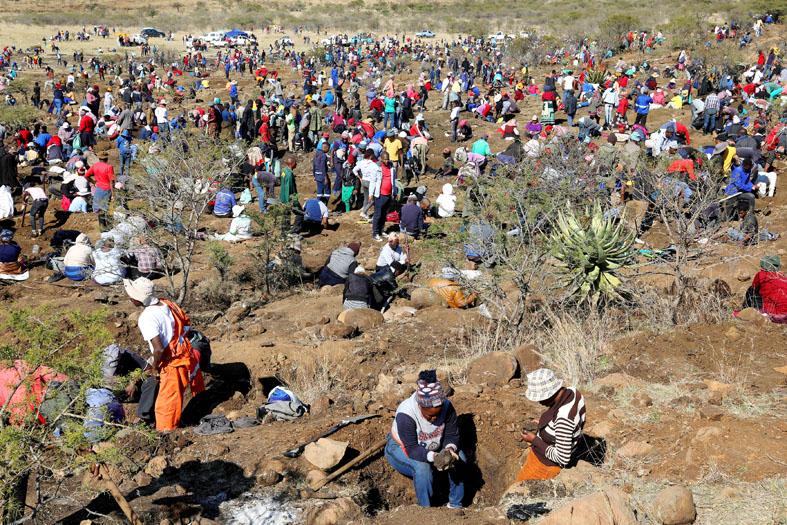Gemstones that sparked a diamond rush to eastern South Africa last week have turned out to be just quartz, according to preliminary findings presented on Sunday.
Thousands of people flocked to a hillside in South Africa’s KwaZulu-Natal Province to dig for mysterious stones first unearthed by a cattle herder and believed to be diamonds.
The rush prompted the South African government to send geoscientists and mining experts to collect samples for testing.

Photo: Reuters
The results quashed the dreams of diggers hoping to come up with a fortune.
“The tests conducted conclusively revealed that the stones discovered in the area are not diamonds,” a local government statement said.
“In fact, what has been discovered are quartz crystals,” it said, adding that the yet-to-determined value of the stones would be “very low” compared with diamonds.
The report said the site — more than 300km southeast of Johannesburg — was near a sill of volcanic rock called dolerite, “which is not in a zone where diamond occurrences are present.”
It added that quartz crystals were common across a sedimentary basin known as the Karoo Supergroup, which stretches over the site, and particularly abundant along the dolerite sill.
The prospect of finding a diamond had sent ripples of hope across one of South Africa’s poorest regions and beyond.
The nation, renowned for its mineral wealth, has struggled with decades of spiraling unemployment worsened by the COVID-19 pandemic.
The diamond rush “highlighted the socioeconomic challenges confronting people in the area,” the statement said.
The South African government reiterated its call for people to vacate the area, citing COVID-19 risks and environmental degradation.

POLITICAL PRISONERS VS DEPORTEES: Venezuela’s prosecutor’s office slammed the call by El Salvador’s leader, accusing him of crimes against humanity Salvadoran President Nayib Bukele on Sunday proposed carrying out a prisoner swap with Venezuela, suggesting he would exchange Venezuelan deportees from the US his government has kept imprisoned for what he called “political prisoners” in Venezuela. In a post on X, directed at Venezuelan President Nicolas Maduro, Bukele listed off a number of family members of high-level opposition figures in Venezuela, journalists and activists detained during the South American government’s electoral crackdown last year. “The only reason they are imprisoned is for having opposed you and your electoral fraud,” he wrote to Maduro. “However, I want to propose a humanitarian agreement that

ECONOMIC WORRIES: The ruling PAP faces voters amid concerns that the city-state faces the possibility of a recession and job losses amid Washington’s tariffs Singapore yesterday finalized contestants for its general election on Saturday next week, with the ruling People’s Action Party (PAP) fielding 32 new candidates in the biggest refresh of the party that has ruled the city-state since independence in 1965. The move follows a pledge by Singaporean Prime Minister Lawrence Wong (黃循財), who took office last year and assumed the PAP leadership, to “bring in new blood, new ideas and new energy” to steer the country of 6 million people. His latest shake-up beats that of predecessors Lee Hsien Loong (李顯龍) and Goh Chok Tong (吳作棟), who replaced 24 and 11 politicians respectively

Young women standing idly around a park in Tokyo’s west suggest that a giant statue of Godzilla is not the only attraction for a record number of foreign tourists. Their faces lit by the cold glow of their phones, the women lining Okubo Park are evidence that sex tourism has developed as a dark flipside to the bustling Kabukicho nightlife district. Increasing numbers of foreign men are flocking to the area after seeing videos on social media. One of the women said that the area near Kabukicho, where Godzilla rumbles and belches smoke atop a cinema, has become a “real

‘WATER WARFARE’: A Pakistani official called India’s suspension of a 65-year-old treaty on the sharing of waters from the Indus River ‘a cowardly, illegal move’ Pakistan yesterday canceled visas for Indian nationals, closed its airspace for all Indian-owned or operated airlines, and suspended all trade with India, including to and from any third country. The retaliatory measures follow India’s decision to suspend visas for Pakistani nationals in the aftermath of a deadly attack by shooters in Kashmir that killed 26 people, mostly tourists. The rare attack on civilians shocked and outraged India and prompted calls for action against their country’s archenemy, Pakistan. New Delhi did not publicly produce evidence connecting the attack to its neighbor, but said it had “cross-border” links to Pakistan. Pakistan denied any connection to